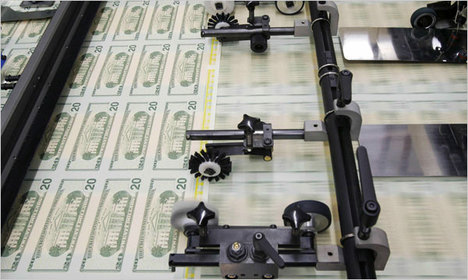Monetary policy reform, not tax cuts, will bring true prosperity

The prelude to every midterm election is fraught with partisan bickering over how best to reallocate the resources of those participating in the state-run economy. These academic debates are usually pointless, as both parties, irrespective of their professed aims, usually have every intention of creating a larger budget and spending more money.
But, every once in awhile the specter of depression rears its ugly head, initiating a lively competition over which party can be most trusted to lower taxes for the sake of the indebted masses. Even if the “Republicrats” intend to lower taxes, even significantly so, the problem of runaway government spending through the monetization of debt will remain the insurmountable obstacle to national fiscal solvency and a stable economy.
Overwhelmingly, arguments from both sides of the aisle over how best to save the faltering “economic recovery” are falsely premised on the notion that pure consumption drives the economy. This Keynesian outlook has been the predominate philosophy of Congress since the inception of the New Deal. Unfortunately, it has led not only the United States, but many countries who peg their currencies to the dollar onto thin ice which is cracking under the weight of acknowledged debt.
It's easy to lose sight of a critical, grounding perspective as a taxpayer in these tough economic times: the state has no money; it can only borrow from other states or take from its citizens what it can get by force, otherwise known as taxation. It used to be that government representatives or kings had to rely exclusively on such strategies to fund their ventures. With the invention of fractional reserve central banking, politicians can now rely on bankers in the private sector to provide them with what amounts to counterfeit money (for an interest fee, of course). In this way, governments can do unpopular things without burdening the taxpayer up front. In America, this pyramid scheme is facilitated by the Federal Reserve System, a private banking cartel, unaccountable to Congress, with a state-mandated monopoly power to issue currency and set interest rates.
The “fiat currency” created by a central bank benefits only the select few who get to spend it first. Its immediate buying power is actually a heinously destructive force which expands the money supply, dilutes the value of the currency, distorts market signals, encourages borrowing and diminishes private investment and capital accumulation. This is called inflation and its most recognizable symptom is the appearance of rising prices of goods. But, this is just an illusion as prices aren't necessarily rising, the value of the unit of monetary exchange is actually going down. Simply put, saving dollars is an exercise in futility as their purchasing power declines over time.
The downside of "cartelized central banking" isn't popularly understood and rarely, if ever, taught in government-run schools. Economist Murray Rothbard explains that, under the prevailing monetary system:
“spending and going into debt are encouraged; thrift and hard work discouraged and penalized...Groups that benefit are the special interest groups who are politically close to the government and can exert pressure to have the new money spent on them so that their incomes can rise faster than the price inflation. Government contractors, politically connected businesses, unions, and other pressure groups will benefit at the expense of the unaware and unorganized public.”
This condition describes our current financial malaise and provides us with all the reasons why true economic recovery will never happen until politicians touch the third rail – monetary policy. Even if taxes are lowered for some, the majority of Americans have to continuously confront the insidious hidden tax of inflation caused by a government which prints and borrows at its leisure. The inflation tax will continue to increase progressively as the government bureaucracy expands with the money supply.
When D.C. is finally deprived of its printing press and forced to limit the scope of its political operations to activities which are perceived by the taxpayer as necessary, we will see true prosperity. If history is any guide, forestalling this inevitable sea change in monetary policy will only make the eventual collapse of the debt-based-dollar that much more painful.




